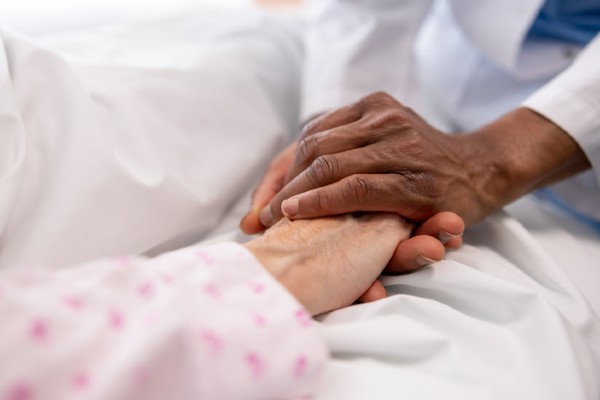
The number of Americans using hospice services is rising as the proportion of the population over 65 increases faster than ever before, according to the U.S. Census Bureau.
The National Hospice and Palliative Care Organization reports that 1.72 million eligible Medicare beneficiaries received hospice care in 2020, the latest year for which data is available. This is a 6.8% increase from 2019.
For nurses, the job outlook across all care settings is strong. Employment of registered nurses is projected to grow 6% from 2022 to 2032, faster than the average for all occupations, according to the U.S. Bureau of Labor Statistics. The bureau also projects that employment of nurse practitioners will grow 45% from 2022 to 2032, much faster than the average for all occupations.
Nurse practitioner Barbara Gunderson, faculty member in the School of Nursing at Purdue Global, discusses what it's like to be a hospice nurse.
What Is a Hospice Nurse?
“Hospice nursing is a specialty that focuses on caring for a patient and their family at the end of life,” Gunderson says. “Hospice nurses deliver palliative care, which is also referred to as comfort care. The ultimate goal is to facilitate a peaceful death.”
Hospice nurses provide:
- Medical care: administering medication and treatments, maintaining medical charts, responding to emergency calls, and providing crisis care
- Emotional and spiritual care: arranging spiritual support services and acting as liaisons to caregivers and spiritual guides
- Caregiver and family support: advocating for patients and their families’ wishes and providing compassionate end-of-life education to patients and families
Hospice nurses are part of a team providing care to the patient and the family. Hospice nurses work with physicians, nurses, physical and occupational therapists, chaplains, pharmacists, dieticians, nursing assistants, and volunteers.
>>Learn More: Choosing a Nursing Specialty: Guidance for New and Experienced Nurses
What to Consider Before Becoming a Hospice Nurse
Before entering this field, contemplate the following:
There Are Emotional and Spiritual Demands
Hospice nurses must be empathetic with the patient and their families while maintaining a healthy detachment.
“It is difficult not to become emotionally involved in hospice,” Gunderson says. “Nurses are aware of the boundaries. We do feel sadness and grief when a patient dies. But there is also a great deal of satisfaction in knowing that you have helped bring about a peaceful death.”
Hospice nurses must also deal with spiritual considerations.
“It is essential that the hospice nurse has a strong spiritual base and understanding of their own spirituality so they can support others in their beliefs,” says Gunderson.
Self-Care Is Essential
Having healthy outlets for your own grief is vital.
“Hospice agencies provide support for staff who deal with frequent loss,” says Gunderson. “Nurses also support their colleagues, giving each other time and space to grieve after a loss. But it’s important to have your own support network and also to engage in activities like exercise, meditation, prayer, and so on.”
>>Read: The Importance of Self-Care for Nurses and How to Put a Plan in Place
Hospice Nursing Offers a Degree of Flexibility
Hospice nurses work in a variety of settings, including the patient's home, assisted living or nursing home facilities, or a hospital. Nurses are needed 24/7, so they usually work in shifts of 8 or 12 hours depending on the facility. There are also hospice and home care agencies that deliver hospice care. These nurses have a caseload of patients they visit regularly, either in a long-term care facility or their homes.
“These nurses also work regular days but will be expected to occasionally be on call evenings and weekends,” Gunderson says.
Hospice Nursing Is a Different Type of Nursing
The focus is not on cure or recovery. As mentioned previously, this may be difficult for some.
“Supporting patients and families through anxiety and stress as they face death and loss can be a blessing for all, including the nurse,” Gunderson says. “It is an honor and a privilege to be with people during what might be considered one of the most stressful life events. Hospice nurses often say they feel like they receive more than they give.”
Compassion at the End of Life
“Both the patient and family have preconceptions of death and the process of dying, and it can be stressful and trigger anxiety,” Gunderson says. “The hospice nurse can prepare them for what to expect and what the signs and symptoms mean. Relieving pain and other distressing symptoms allows the patient and family to have quality time together — reminiscing, forgiving, and expressing gratitude and love before it is too late.”
Sometimes, there is conflict in end-of-life situations. The patient may be ready to die, but the family is not ready to let go. Individual family members may not agree on the plan of care. The hospice nurse can help mediate and try to create a calm patient environment.
“Sometimes, outside help is needed, such as involving the entire care team or an ethics committee meeting,” says Gunderson. “The hospice nurse always has backup in challenging situations.”
Hospice Nursing Is Both Challenging and Fulfilling
Guiding people and their families through the end of life isn’t an easy profession by any means, but for those who pursue it, it is a truly gratifying career.
“Hospice nursing is not for everyone,” Gunderson says. “But if you like to develop a relationship with patients and families and know that you have made a huge difference in someone’s life, hospice nursing might be for you.”
If a BSN or MSN could help you reach your career goals, consider Purdue Global's online RN-to-BSN degree program or online master's degree in nursing. Our programs are entirely online, so you can keep working and tending to other obligations while going to school. Request more information today.
Filed in:
Your Path to Success Begins Here
Learn more about online programs at Purdue Global and download our program guide.